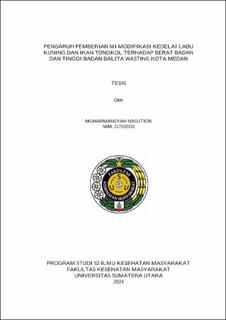| dc.description.abstract | The prevalence of wasting, reaching 7.8% in the city of Medan, is the primary focus of this research. This study aims to improve the nutritional status of vulnerable children. The use of noodles as an intervention tool was selected for their practicality and ease of preparation. This research employed a quasi-experimental design with pre- and post-treatment assessments using control and treatment groups. It aimed to determine the impact of modified noodles made from yellow pumpkin, soybeans, and tuna on the weight and height of 18 wasting toddlers in Medan. Data collection methods included food recall before and after the treatment, and weight and height measurements for both the treatment and control groups. The modified noodles were administered to the groups in 100-gram portions daily for 30 days from November to December 2023. The results showed an average weight gain of 457.22 grams, with no significant increase in height, leading to an improvement in the z-score for weight-for-height. The post-test results between the control and treatment groups using the independent T-test were significant (p=0.001). Based on the food recall, there was an increase in daily energy and protein intake, with the unpaired T-test indicating significant differences in daily protein and energy intake before and after the intervention. This difference was significant between the two groups after consuming the modified noodles. These findings support optimal growth and highlight the urgency of cross-sector collaboration for further implementation. | en_US |


